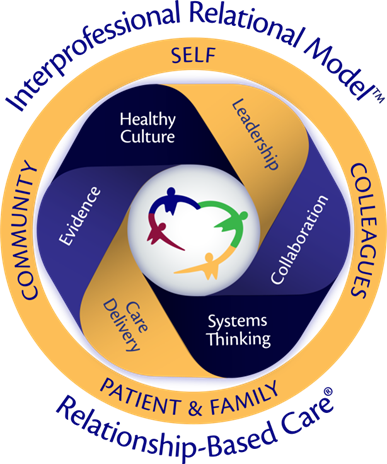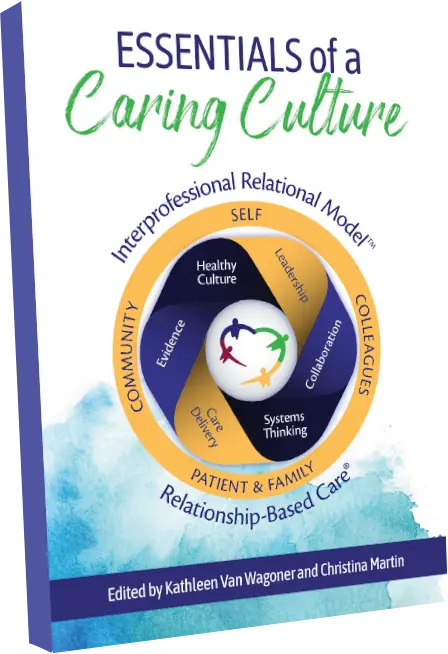Interprofessional Relational Model™
Introducing the Interprofessional Relational Model™ (IRM)
The Interprofessional Relational Model™ (IRM) is an operational blueprint for transforming organizational culture. It aligns people, systems, and processes around a single aim- creating the best possible experience for patients, families, and everyone who works in health care.
IRM works from the inside out, drawing on and strengthening what already exists within an organization’s culture. By connecting purpose and meaning with systems and behaviors, IRM helps people bring their whole selves to work in ways that feel authentic and sustainable.
Many describe it by saying, “IRM isn’t just what we do- it’s who we are.” Because transformation through IRM is deeply personal, it becomes ingrained in the organization’s identity. It’s not a passing initiative, but a shared, lasting commitment to compassionate, coordinated, relationship-centered care.


Essentials of a Caring Culture: The Interprofessional Relational Model™
Essentials of a Caring Culture: The Interprofessional Relational Model™ introduces a groundbreaking evolution of Creative Health Care Management’s classic Relationship-Based Care® framework. Edited by Kathleen Van Wagoner and Christina Martin, this book honors the legacy of RBC while addressing the realities of today’s health care—where integrated teams, equity, and clinician well-being are more essential than ever. The Interprofessional Relational Model™ (IRM) expands the focus of relational practice beyond nursing to include every discipline and community partner contributing to health and healing.
Learn More about the Interprofessional Relational Model in this NEW CHCM publication
The Evolution of Key Relationships in the Interprofessional Relational Model™ (IRM)
Decades of guiding organizations through Relationship-Based Care® (RBC), and now IRM, have shown that the most powerful aspect of this work lies in the key relationships:
Relationship with self
Relationship with colleagues
Relationship with patients and families
These relationships provide a meaningful framework for reconnecting with purpose, strengthening teams, and deepening compassion for those we serve.
As RBC evolves into IRM, a fourth relationship gains recognition: relationship with the community.
The relationship with community acknowledges that health care exists within social, cultural, and environmental contexts that shape the lives of patients, families, and care teams. It challenges organizations to foster trust, advance health equity, and contribute to the collective well-being beyond the walls of traditional care settings.
Together, these four key relationships- self, colleagues, patients and families, and community– form the foundation of IRM. They reflect the belief that transformational care grows from meaningful human connection within ourselves, with one another, with those we serve, and with the world around us.
Begin Your Organization’s Transformation
Create a united culture where shared ownership leads to exceptional outcomes across your entire organization.
The Essentials of the Interprofessional Relational Model™ (IRM)
At the heart of IRM are six essentials that, when nurtured together, create a culture where patients and families remain the focus of all we do:
Healthy Culture
Leadership
Collaboration
Care Delivery
Systems Thinking
Evidence
Each essential supports the four key relationships and must be intentionally developed to achieve organizational excellence and ensure meaningful, sustainable change.

Essentials of a Caring Culture: The Interprofessional Relational Model™
Essentials of a Caring Culture: The Interprofessional Relational Model™ introduces a groundbreaking evolution of Creative Health Care Management’s classic Relationship-Based Care® framework. Edited by Kathleen Van Wagoner and Christina Martin, this book honors the legacy of RBC while addressing the realities of today’s health care—where integrated teams, equity, and clinician well-being are more essential than ever. The Interprofessional Relational Model™ (IRM) expands the focus of relational practice beyond nursing to include every discipline and community partner contributing to health and healing.
Learn More about the Interprofessional Relational Model in this NEW CHCM publication
